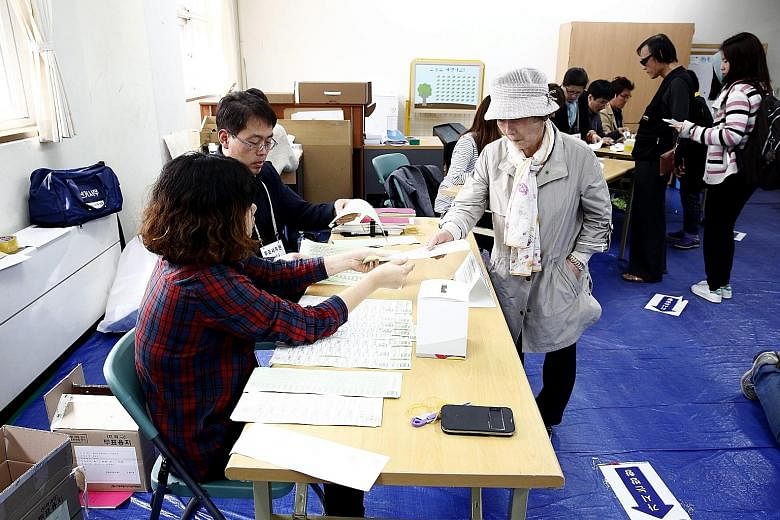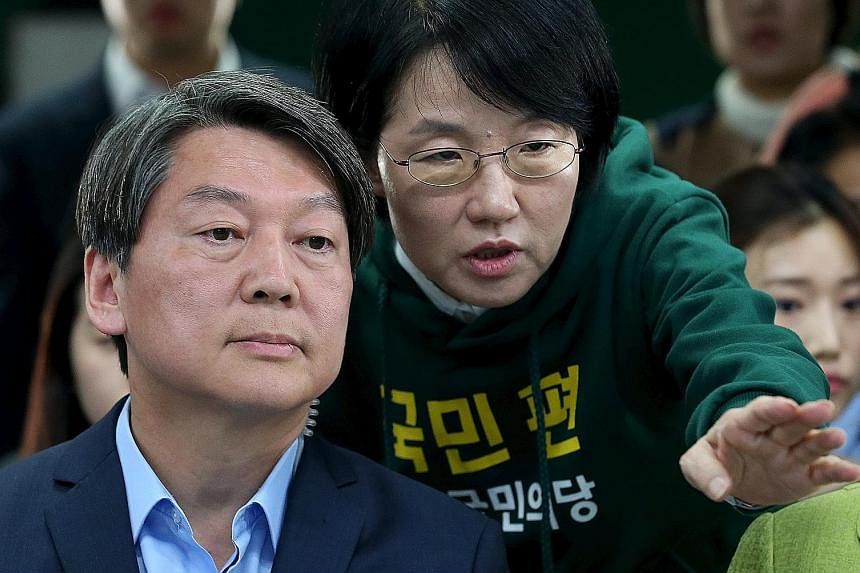South Korea's ruling Saenuri Party lost its parliamentary majority in yesterday's election in a devastating blow to President Park Geun Hye and her efforts to fix the economy and create jobs for young South Koreans.
Yesterday's election to fill the 300-seat National Assembly was seen as a referendum on the economic pledges made by Ms Park, who has less than two years left to her single five-year term.
Projections by cable news channel YTN, with more than 70 per cent of votes counted, gave Saenuri 130 seats, fewer than its current 146. This will be the first time in 16 years that a ruling party does not have more than 50 per cent of the seats.
The main opposition Minjoo Party and the People's Party, which split from Minjoo, were tipped to bag 116 and 38 seats respectively.
Saenuri's weakened hold in Parliament could render Ms Park a lame duck and leave its lawmakers with little power to push through badly needed reform Bills to shake up the sluggish economy, which saw youth unemployment hit a record high of 12.5 per cent in February.
Earlier polls had predicted that the ruling party would win at least half the seats in the National Assembly but fall short of the three-fifths required to pass Bills unilaterally.
The Park administration's tough stance on North Korea was expected to boost her party's electoral fortunes, but it appeared that its handling of the economy was what counted for voters in the end.
Opposition supporter Pyo Yong Suk said he hopes more opposition members can be voted into Parliament so that they can keep the ruling party in check.
Saenuri Party currently holds half of the 292 filled seats, while the Minjoo Party has 102 seats and the People's Party, 20.
"With more opposition members, the National Assembly can play the role of a watchdog instead of being a mere puppet of the Park Geun Hye administration," said the 46-year-old doctor.
"They can also reveal loopholes in policies proposed by the ruling party and block the controversial anti-terrorism Act and regressive labour reforms," he added, referring to legislation aimed at giving the intelligence service more power.
Dancer Jojo Cho, 31, did not reveal which party he voted for, but said he hopes that "my one small vote can effect change in the country".
He hopes the new National Assembly can focus on improving the lives of ordinary people.
Vote counting was still under way at press time.
Some analysts say a coalition government may emerge after yesterday's election, in a departure from the current system with two dominant parties.
Korea University's political science professor Lee Nae Young said this could spell good news for people waiting to see Bills passed to revitalise the economy.
Prof Lee sees the new People's Party, which is led by 2012 presidential contender Ahn Cheol Soo, playing a major role.
He said: "Many Bills are blocked because of polarisation within the Parliament. After this election, if the People's Party can play a negotiating role and collaborate with Saenuri Party, all the stalled Bills can be passed."
Yesterday's voter turnout was about 58 per cent of the more than 42.1 million eligible voters, or 24.4 million, according to the National Election Commission. The number included 5.13 million people who voted last Friday and Saturday as part of an early voting exercise.
This year's turnout is higher than the 54.2 per cent for the previous parliamentary election in 2012.
Mr Park Hyun Soon, 79, a retiree and Saenuri supporter, said he hoped the government could devote more efforts to improve the economy and come up with better education and welfare policies.
"I hope it will take better care of elderly people like me," he added.



